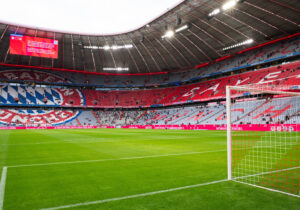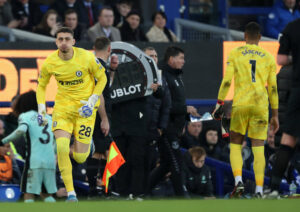Harry Maguire has rightly received a lot of plaudits for his performances for England at Euro 2020. It started with his return from injury to play in England’s third and final group game of the competition and it ended with the Manchester United captain crashing his penalty past Gianluigi Donnarumma in Sunday’s final shootout. He was even named in the Team of the Tournament.
Observers have been quick to point out that there has been more to Maguire’s game throughout the tournament than simply his class and ability as a central defender. His leadership has also risen to the fore. The character he showed to step up after Harry Kane and drive his spot-kick into the top corner acts as a testament to that. Although England’s tournament ultimately ended in defeat, the towering status that has since been attributed to Maguire has been years in the making.
How Harry Maguire Became One of England’s Leading Men
Increased Expectation at Club Level
The developments in Maguire’s game that have culminated in him becoming a leader of men can be traced back to England’s run to the World Cup semi-finals in 2018.
Then at Leicester City, Harry Maguire impressed hugely throughout the tournament in Russia as England surpassed all expectations and made a nation fall in love with its national team once more. The centre-back swiftly took on a man of the people image and became one of the most respected figures in English football.
José Mourinho wanted to bring him to Manchester United, but the Red Devils were unable to agree a deal with his club. One year later, and with Ole Gunnar Solskjaer now at the helm, the Old Trafford giants finally succeeded in getting their man.
The £80 million fee was at the time seen as excessive in most quarters. Maguire was written off by several people before he had even played his first game for his new club. Paul Merson was particularly unceremonious in his assessment of whether Maguire could help Manchester United improve.
Perhaps unsurprisingly, the newfound scrutiny and weight of expectation placed on Maguire’s shoulders seemed too much for the former Sheffield United youngster to handle at the time. Every error was magnified, and the dissenting voices only grew over the defender’s opening months at Old Trafford.
What happened next would therefore come as something of a surprise. Following the departure of Ashley Young to Inter Milan in January 2020, Solskjaer made Maguire his captain at Old Trafford. The centre-back had only been at the club for five months and had arguably been underperforming since walking through the door. How Maguire responded would become a defining moment in his footballing career.
Accepting Responsibility in Manchester
Solskjaer was aware of the need for a rebuild at Old Trafford. At the time he handed Maguire the armband, his team were outside of the Premier League’s top four, and its absence of leaders was obvious. After all, this was before the arrival of Bruno Fernandes from Sporting Club.
The hope was that Maguire would grow into the role. “I’ve been, not surprised, but I’ve been impressed with his leadership skills,” Solskjaer said at the time.
Looking back with the benefit of hindsight, the Manchester United manager was correct in his judgement. Maguire has risen to the occasion since accepting the armband, and both his and United’s form has risen on a steady upwards trajectory in the year-and-a-half since.
Successive top-four finishes in the Premier League have followed. All that is missing has been the trophies to show for it. Having witnessed his performances for his country this summer, many Manchester United supporters have asserted that if Maguire was on the pitch and not injured for the Europa League final, the Red Devils would have overcome Villarreal and won the trophy. Doing so would have given Solskjaer his first silverware as United manager.
Elevating Himself With England
The fact that some doubts remained over Maguire at the beginning of this summer’s European Championships now seems churlish. However, given the form of Aston Villa‘s Tyrone Mings in England’s first two group games, while the Manchester United man was working on a return to full fitness, some were reluctant to see Maguire return to the side at all.
Over the following five matches, all those doubts dissipated in their entirety. Along with the excellent John Stones, Maguire’s performances at centre-back provided the bedrock that took England to the final. His emphatic penalty took them to the very cusp of winning it.
The term ‘world class’ has since been mentioned alongside Maguire’s name. At 28 years of age, if the defender can maintain the level he set throughout the summer into next season and beyond, it will be mentioned a lot more frequently and with a lot more certainty.
Harry Maguire has come a long way in a short space of time and has developed a knack for carrying others with him and turning doubters into believers. The question now is whether he can lead England one step further at the World Cup in Qatar?
Main Photo






